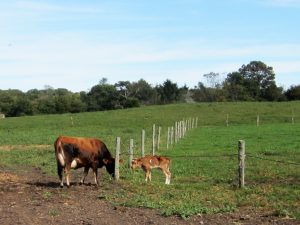 In 1999 the South Kingstown Land Trust protected 55 acres of pastureland on Camp Fuller Road owned by the Bayfield Corporation that was poised to become a subdivision. In 2002 SKLT protected the Rocky Meadows Farm’s 16 acres, and in 2012 added a 16-acre farm on Jerry Brown Farm Road previously owned by Bud Browning and now farmed by Nick Papa. Now SKLT has successfully protected the Whaley Farm, 40 acres of working farmland – which links the previously preserved farmland, creating a corridor of 127 acres of productive farmland in the southeastern part of town. First, SKLT thanks George and Karen Whaley for sticking with this project for over six years until it became reality in late September. SKLT also thanks the 82 donors who contributed to the purchase of development rights for the Whaley Farm.
In 1999 the South Kingstown Land Trust protected 55 acres of pastureland on Camp Fuller Road owned by the Bayfield Corporation that was poised to become a subdivision. In 2002 SKLT protected the Rocky Meadows Farm’s 16 acres, and in 2012 added a 16-acre farm on Jerry Brown Farm Road previously owned by Bud Browning and now farmed by Nick Papa. Now SKLT has successfully protected the Whaley Farm, 40 acres of working farmland – which links the previously preserved farmland, creating a corridor of 127 acres of productive farmland in the southeastern part of town. First, SKLT thanks George and Karen Whaley for sticking with this project for over six years until it became reality in late September. SKLT also thanks the 82 donors who contributed to the purchase of development rights for the Whaley Farm.
The Whaley Farm is one of our town’s oldest continuous working farms, dating to the 1600s, and in the Whaley family since the 1800s. The farm now has 68 beef cattle and 18 dairy cows and grows sweet corn and other vegetables that are sold at their stand, located on the property. RI Historical Cemetery #73 is located on the farm, where Hazards and Peckhams are buried. The northeastern stone boundary wall is one of the oldest in town – the wall dates from the Pettaquamscutt Purchase in the 1600s, and continues all the way to the Salt Pond. Over half of the Whaley Farm contains prime farm soils or soils of statewide importance, Bridgehampton and Enfield loams. Protection of this parcel will ensure that this farmland continues to be productively farmed, and prevents a conversion to residential development.
Funding for this project was provided by grants from the RI Agricultural Land Preservation Commission, the Town of South Kingstown, the Farm and Ranchland Protection Program of the USDA Natural Resources Conservation Service, and the 1772 Foundation, as well as private donations and a reduction in sale price from the family.
Land Protection Director Joanne Riccitelli comments: “It’s been a pleasure working with the Whaleys over these years. I’m really happy all the funding sources finally came together so we could get this done, for the family, for future generations of farmers, and for all of us who love to know where our food comes from.”
All the farms mentioned here are protected by a restrictive legal covenant, sometimes called a conservation easement and sometimes a deed to development rights. This restriction prevents the subdivision of the property or residential construction and ensures that these farms will remain undeveloped in perpetuity. These restrictions are recorded in the land evidence records of the Town and run with the land, remaining valid and in force with all successive owners. The farm families continue to own and operate their farms.
